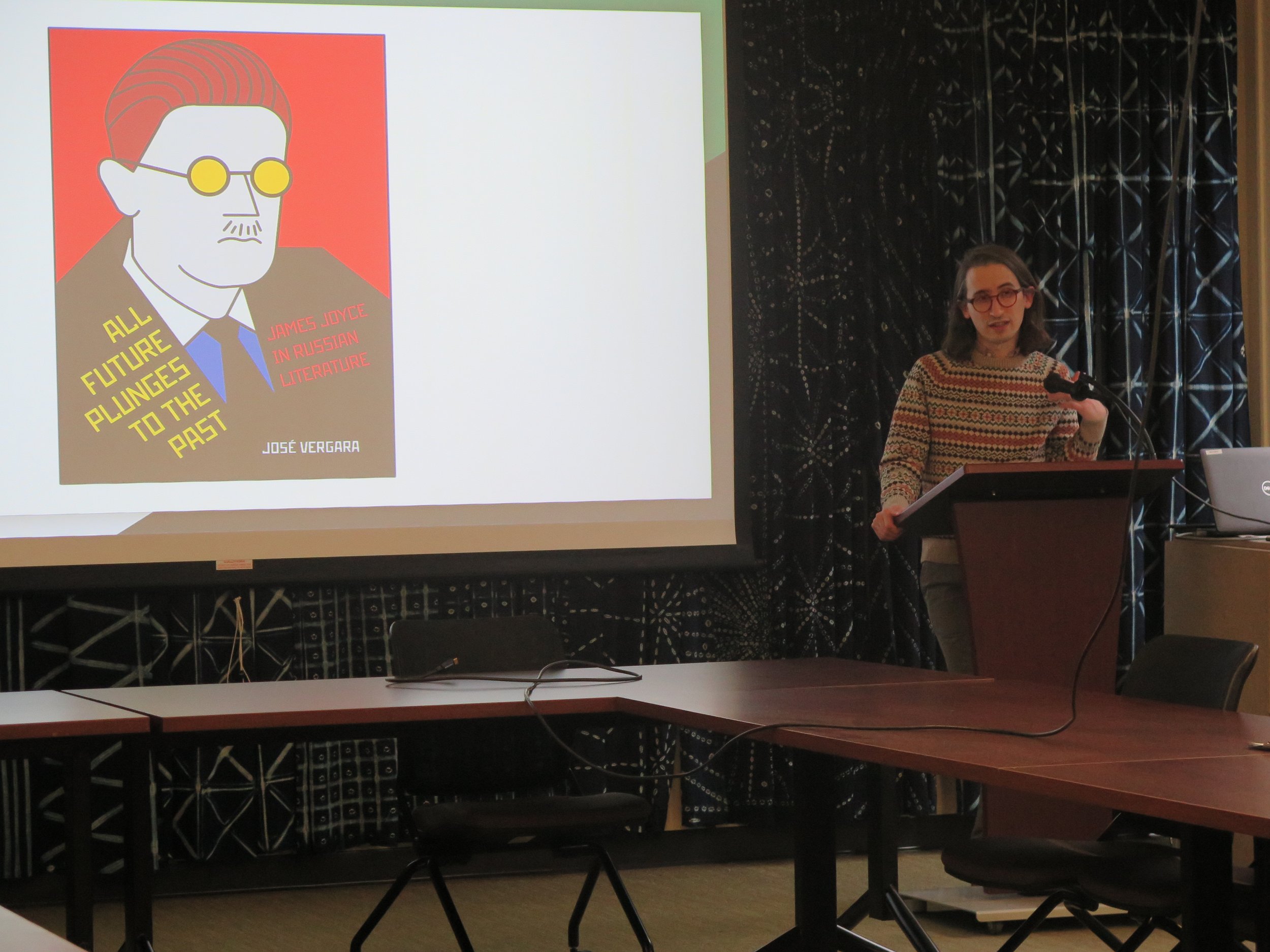RESEARCH: PAST, PRESENT, & FUTURE
All Future Plunges to the Past:
James Joyce in Russian Literature
When James Joyce wrote that Ulysses (1921) would leave “the professors busy for centuries arguing” over its meaning, he did not factor in the exponential effort it would require to trace the novel’s effects on other authors in other traditions. My first book, All Future Plunges to the Past: James Joyce in Russian Literature (Cornell University Press / NIUP , 2021) explores how Russian writers from the mid-1920s to the present day have read (literally and figuratively) Joyce’s fiction and how they then creatively responded to it. This study deploys close readings of several novels, while drawing on theories of intertextuality. Individually, each case study—the major works of Yury Olesha, Vladimir Nabokov, Andrei Bitov, Sasha Sokolov, and Mikhail Shishkin—serves as an example of a different kind of literary relationship; together, they represent a history of how our understanding of intertextuality has shifted over the last century. I first identify and explicate the various connections to Joyce present in these Russian authors’ texts, then I consider how their environments influenced their readings of their Irish predecessor. In this way, I underscore the different roles that have been assigned to Joyce by his Russian counterparts. At the same time, a clear Russian Joycean tradition does exist. The works in question are united by common themes, such as generational conflict, the influence of the past, and, most significantly, Joyce’s idea that the creative individual may rewrite history and become father to himself through lasting art. All Future Plunges to the Past therefore illuminates how Russian writers have used Joyce’s ideas as a critical lens to shape, prod, and constantly re-define their own place in literary history.
To extend my analysis to the present day, I interviewed a range of writers and critics, including Aleksei Salnikov, Dmitry Bykov, Anna Glazova, Marina Stepnova, Zinovy Zinik, Ksenia Buksha, and Ivan Sokolov, among others. The various perspectives included in my conclusion reveal how the Russian Joyce is no less dynamic today. He has become an exile, a peripheral writer (in both senses of the word), a relic of the past, a gargantuan technical innovator, a symbol for the free spirit of prose, a passing fancy in one’s youth, a hooligan, and a master of life-creation.
Reimagining Nabokov: Pedagogies for the 21st Century
Here, eleven teachers of Vladimir Nabokov describe how and why they teach this notoriously difficult, even problematic, writer to the next generations of students. Contributors offer fresh perspectives and embrace emergent pedagogical methods, detailing how developments in technology, translation and archival studies, and new interpretative models have helped them to address urgent questions of power, authority, and identity.
Practical and insightful, this volume features exciting methods through which to reimagine the literature classroom as one of shared agency between students, instructors, and the authors they read together.
“Carceral States:
Contemporary Russian Prison Writing”
My next manuscript-length project, inspired by recent teaching experiences, addresses the latest in Russian incarceration stories by such writers as Mikhail Khodorkovsky, Evgeny Vodolazkin, Oleg Navalny, Nadya Tolokonnikova, Ali Feruz, Oleg Sentsov, Viktoria Lomasko, Guzel Yakhina, Zakhar Prilepin, Eduard Limonov, and others. In what I am tentatively calling “Carceral States: Contemporary Russian Prison Writing,” I explore how these authors position themselves vis-à-vis their predecessors and challenge the tradition’s form, often through both word and image. I am interested in texts written by those who have been jailed (as well as those who became writers because they were imprisoned) and stories that turn their gaze further back, such as Vodolazkin’s, Yakhina’s, and Prilepin’s fictionalized accounts of Soviet prison labor camps. In other words, I examine the two poles of the tradition and the intersections between history and fiction found in between. This interdisciplinary study will provide a definition of the Russian Prison Text and explicate the connection between literary narrative and the modern Russian prison system in socio-political terms.
In addition to these writers and research themes, I have also published articles on the multilingual Czech surrealist poet Ivan Blatný and on Daniil Kharms's short story "Blue Notebook No.10" through the lens of cognitive linguistics, among other topics. For a complete list of publications, including reviews, translations, and essays, as well as works in progress, please see my CV.

